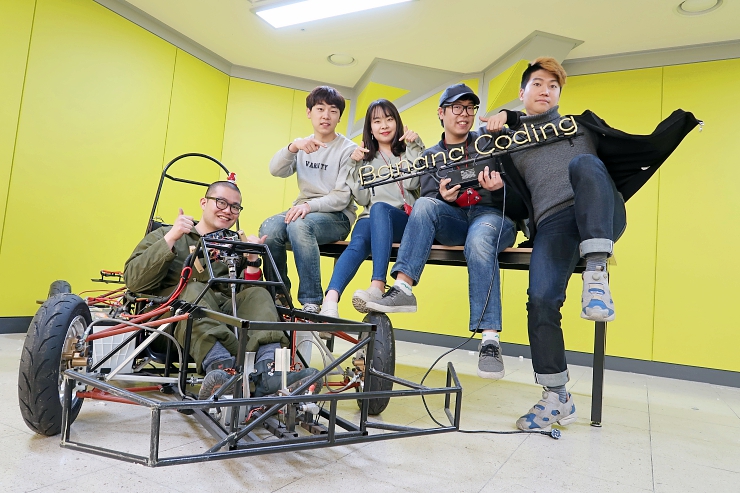Over the past decade educational programs have helped young children learn about the basics of computer programming, and many young people are beginning to see coding as a potential choice for their future. With the rise in code-learning programs, Banana Coding, has also been teaching coding to beginners – but to adults instead of children. Choo Seungho from VentureSquare caught up with the startup’s founders Shin Myeongmin and Choi Eunhee.

Shin and Choi originally began developing Banana Coding as an internal venture while both working at hardware accelerator N15. It only took a month for them to develop the service, launching a beta version in February.
“Because we finished so quickly, we got a lot of suspicious looks from others around us,” says Shin.
It’s not suprising that some were in disbelief, with six types of program already on offer from a service that launched just a few months ago. Prior to starting the company, Shin had gained a lot of experience while managing numerous projects inlcuding drone and mobile hackathons. Banana Coding was born after he proposed the concept to a coworker, co-founder Choi.
“Some time ago I experienced starting a company and failing, which made me realize that quickly executing your ideas was the most important thing,” says Choi, whose influence on the company has shown through in this respect. Banana Coding was able to push out a quick launch thanks to its three-strong lecture team with engineering backgrounds and expertise in different areas. The team focuses on teaching how to create hardware items, while the two founders, both with backgrounds in computer science, help bring the hardware to life through coding.

Shin had actually considered starting a coding school as early as university. Back then he was coding by hand and sitting written exams, with no computer at hand.
“Even though English is a compulsory subject, despite continual study, they often can’t get a word out in front of a foreigner. I felt that coding might become the same way,” Shin explains.
It’s part of the reason why Shin has made Banana Coding’s program flexible, so that anyone with interest can take part. While somewhat of a paradox, the company’s team also didn’t want coding to go the way of private English education either, a huge industry in Korea.
They were doubtful about whether having people pay to learn coding was the right thing to do, and didn’t want people coming away not actually knowing how to use what they’ve learned. Another problem is that many learn-to-code programs only teach the basics and don’t continue into intermediate or advanced concepts.

Coding is here to stay
“Not everyone needs to become a programmer, but everyone will have to learn aboutcoding,” the team told us.
With the 4th industrial revolution approaching, there is a high probability that work in the future won’t be possible without hiring or partnering with a developer. This means that most people will need basic knowledge about coding, just as manager would have knowledge about basic accounting, even if hiring somebody else to do it.
From next year, programming will be implemented as a mandatory subject in middle schools, but coding curriculums don’t really fit students well. For middle school students, who will now come into contact with programming throughout their school life and adulthood, many of the new terms and jargon are unfamiliar. For adults who have missed out on this knowledge, learning these basics will be just as important.

Banana Coding has decided to concentrate on what they call “making coding” — controlling hardware that students develop themselves through scripts. Programs are three weeks long and there are usually around six different cirrculums to choose from.
By assembling their own simple projects which use components such as LEDs, students naturally learn how to code for a specific purpose. One example is a smart pot which displays a facial expression using LEDs that reflects the condition of the plant inside the pot. Students learn how to code the LED controls first and then craft the pot themselves with an expert.

Programs for children and entrepreneurs are also in the pipeline for Banana Coding. Nevertheless, because Banana Coding’s main focus is on teaching adults, projects and creations are generally things that can be used in everyday life rather than robots and cars.
Future plans include projects beyond three months, with items such as mood lamps, cocktail makers and Bluetooth speakers lined up. Once these projects are finished, students will be able to take part in networking events where they can showcase their projects.
This article has been adapted from an original article in Korean by Choo Seungho.






